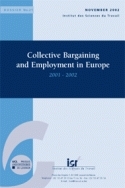- EAN13
- 9782930344188
- Éditeur
- Presses Universitaires du Louvain
- Date de publication
- 1 août 2005
- Collection
- DOSSIERS DE L'I
- Nombre de pages
- 436
- Dimensions
- 16 x 6,1 cm
- Poids
- 320 g
- Langue
- eng
Collective Bargaining And Employment In Europe
Inconnu
Presses Universitaires du Louvain
Prix public : 27,30 €
Does collective bargaining play a role in employment in the European Union today? The European Employment Strategy implemented in the European Union since 1997 invites social partners in all member states to participate in the promotion of employment at all levels. Is this the role of trade unions and employers organisations? Do social partners in the member states negotiate employment? Do they contribute to an objective of full employment? Do they want to improve 'employability'? Do they, finally, negotiate and reach agreements on such issues? Building on a in-depth study conducted by a European-scale network of experts for the DG Employment and Social Affairs of the European Commission, this report addresses these crucial issues. It analyses processes of collective bargaining and agreements on employment in the fifteen member states in 2000 and 2001. It includes national insights as well as comparative analyses of current trends. Researchers at the Institut des Sciences du Travail, a Department of the Catholic University of Louvain, here produce a fourth review of recent developments observed in the field of employment bargaining in Europe. This analysis, which has been conducted at the request of DG Employment and Social Affairs, focuses on agreements negotiated in the field of employment, and on the identification of the coordination mechanisms that structure these negotiations. The study contains 15 national contributions.


















